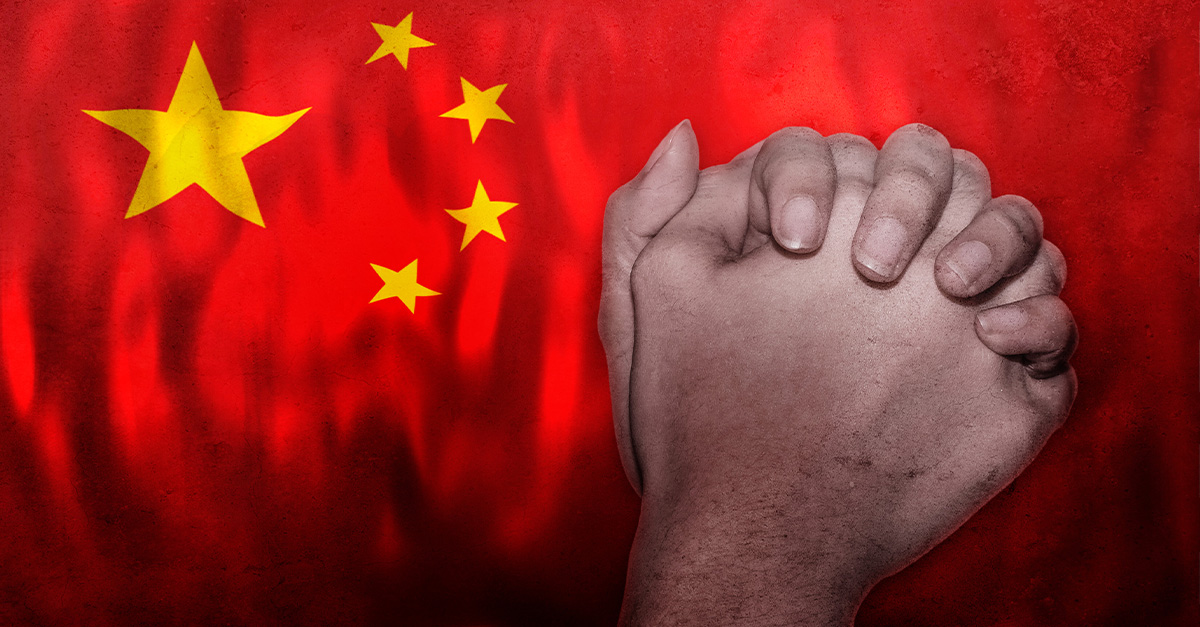


Get a free copy of Parental Rights & Education when you subscribe to our newsletter!

The explosive growth of Chinese Christianity is on a collision course with a government determined to centralize power in the Communist Party in ways not seen since the death of Mao.”
Walter Russell Mead
Beginning on March 1, the Chinese government will ban all unauthorized religious content from the Internet as part of an effort to “sinicize” all religions and make them compatible with Chinese communist state ideology.
The challenge that the Chinese Communist Party (CCP) is grappling with is that it has not been able to successfully control and contain the spread of religious activity in the same way that it has political dissent.
Christianity, in particular, is on the rise in China. In 1976, the year Chairman Mao Zedong died, there were as few as 1 million professing Christians in China, but today, that number has skyrocketed to more than 100 million Protestants and another 10 to 12 million Catholics, with much of that growth occurring over the last decade.
This trend has been alarming to the CCP, especially the projections that the number of Christians could reach 300 million by 2030, and they have been trying to counter it ever since. As Walter Russell Mead, a professor at Bard College and fellow at the Hudson Institution, recently warned in a Wall Street Journal op-ed, “The explosive growth of Chinese Christianity is on a collision course with a government determined to centralize power in the Communist Party in ways not seen since the death of Mao.”
The CCP has been increasing restrictions on religious activity across China over the past several years. It has removed crosses from some churches and razed others, heavily regulated worship meetings and the distribution of religious literature, and inflicted extreme persecution, detainment, and torture of religious dissidents—and is currently engaging in genocide of the Uighur Muslim minority.
Yet in contrast to their totalitarian cousins in 20th century Soviet bloc countries, the CCP has chosen a slightly softer but infinitely more devious approach towards religious persecution.
Instead of outright banning religious practice that would entice Chinese citizens to seek and recognize a higher authority than the Maoist state, the CCP instead seeks to keep the faithful on a tight leash.
This gives the façade to the global community that China protects religious freedom but also allows the CCP to maintain strict control over what it deems to be “authorized religion,” ensuring that these government-controlled religious organizations only perpetuate ideas and beliefs that can be, well, sinicized and fused with party ideology.
One example is the government’s formation of its own “Christian” church, the Three-Self Church, which touts the principles of self-propagation, self-support, and self-governance (which is in direct opposition to the Christian principle of “dying to self”).
Since the CCP decides what gets preached, its sermons and Bible studies perversely twist the main theological teachings of the Gospel, denying, for example, that Christ died for the sins of the whole world or that Christ forgave the adulterous woman. Among other rules, it forbids evangelizing; bars government officials, teachers, soldiers, children, and teenagers from being Christians; and bans any preaching about Christ’s Resurrection and Second Coming.
Last year, as the CCP celebrated its 100th anniversary, the Three-Self Church held an exhibit on CCP’s history promoting Christianity (carefully omitting how it has persecuted believers) and issued guidelines on how to integrate Xi’s anniversary speech into sermons and Bible teaching.
Meanwhile, house churches and other unauthorized religious gatherings are closely watched and often raided, resulting in arrests and detainment. One chilling report coming out of China over the last year detailed mobile torture units that detain and terrorize dissident Christians, Falun Gong practitioners, and Muslims who refuse to agree to the state’s terms of worship.
Not surprisingly, the United States Commission on International Religious Freedom (USCIRF) placed China on its 2021 list of countries of particular concern for religious freedom violations.
“Religious freedom conditions in China continue to deteriorate,” the report stated. “The communist Chinese government has created a high-tech surveillance state, utilizing facial recognition and artificial intelligence to monitor and harass Christians, Tibetan Buddhists, Falon Gong, and other religions. Independent experts estimate that between 900,000 and 1.8 million Uighur, Kazakh, Kyrgyz, and other Muslims have been detained in more than 1,300 concentration camps in Xinjiang.”
The state efforts to control and oversee all religious practice in the country are two-fold. In addition to these more heavy-handed tactics, it also employs overt propaganda efforts from within state-controlled religious bodies. As an example, the CCP is having the Bible re-written to reflect CCP ideology and law.
In early December, President Xi Jinping underscored the importance of “upholding the principle of developing religions in the Chinese context and providing active guidance for the adaptation of religions to socialist society” at a national conference on the country’s religious affairs, according to The Indian Express, stating, “Efforts are needed to better rally and guide religious believers to work together with the general public to develop China into a great modern socialist country in all respects and realize the Chinese Dream of national rejuvenation.”
He added, “Religious activities should be carried out within the scope stipulated by laws and regulations, and should not impair the health of citizens, offend public order and good morals, interfere with educational, judicial, and administrative affairs, as well as social life.”
As human rights magazine Bitter Winter explained, President Xi called for full Chinese government oversight into religious practices, which should be “firm in ideology and politics, adhere to Marxist religious views, and strengthen the construction of the discipline of Marxist religious studies,” as well as a include a crackdown on “religious propaganda” online.
This is all part of the CCP’s sinicization effort, which was launched in 2015 as a plan to “[transform] religious beliefs, faith, practice, rituals in accordance with Chinese culture and society,” as The Indian Express has defined it.
On the heels of Xi’s call for expanded efforts to conform Chinese religious life to its state ideology, new Administrative Measures for Internet Religious Information Services were established and are set to go into effect by March 1. Bitter Winter reported that under the new measures, one will need an “Internet Religious Information Service License” to share religious content on the Internet.
Licenses will only be granted to “legally contracted” organizations, meaning state-approved members of the five authorized religions in China, which Bitter Winter describes as the “CCP-controlled organizations for Protestant Christianity, Catholicism, Buddhism, Islam, and Taoism.” Those licensed and authorized to disseminate religious material online will be subject to surveillance by the state to ensure they are only conveying appropriately sinicized beliefs, and licenses can be terminated if content aims to proselytize or to “induce minors to believe in religion.”
This is just the latest digital attack on sincerely free religion. Last year, China banned online Bible sales and restricted a number of Christian social media accounts and Bible apps. Meanwhile, Apple has faced criticism on more than one occasion for removing religious apps that run afoul of CCP restrictions.
When we consider the importance of religious liberty, we often forget how important it is that this includes the liberty to share the faith and be converted. China wants to ensure that its citizens are given the illusion that they are free to worship by providing them with their own, CCP-approved manner of worship, but evangelizing true religion poses a serious threat to their stranglehold on every aspect of the citizens’ lives, right down to their spiritual convictions.
Nothing threatens authoritarians more than the Gospel and the biblical truths about who God is, particularly those who defy His laws and usurp His authority in the lives of His people.
As long as nominal Christian churches are content to blend their religious activities with CCP propaganda and ideology, they are safe to continue to operate. Meanwhile, those who seek the full Gospel and believe in the full authority of Scripture are all but banned from sharing their faith online — and are at even more risk of being persecuted.
Despite all these efforts, the darkness of CCP persecution, lies, and manipulation cannot hide the light that is found in Christ Jesus. In fact, His light and truth shines brighter than ever under such circumstances, and, as such, there is no doubt that the brave underground Christian Church in China will continue to seek Him, spread His Word, and grow in faith and strength.
Christians, please pray for those who will obediently risk all to continue sharing the Gospel in China. They are up against more than we can possibly imagine.
Christian conservative news and issues that matter. Curated just for you!
